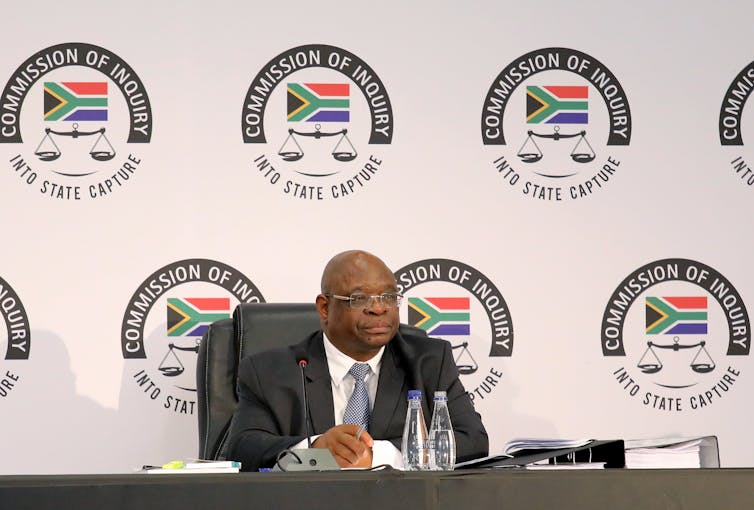Why inquiry into corruption in South Africa needs to act with urgency
By: Richard Calland, University of Cape Town

EPA-EFE/Kim Ludbrook
A commission of inquiry into corruption in South Africa is underway. How it goes about its work, and delivers on its mandate, will have profound constitutional and political consequences. This is more so because it is clear that deposed former President Jacob Zuma, who is at the core of the allegations, has launched a fightback campaign that can undermine President Cyril Ramaphosa’s efforts to clean up government.
The remit of the commission, which is headed by Constitutional Court Deputy Chief Justice Raymond Zondo, is to establish the extent of what’s become known as “state capture” by rogue elements in government. Its findings will reveal how the country’s democracy was so imperilled within two decades of its founding election in 1994. It’ll also help ensure that the necessary remedial action is taken to prevent a repeat.
South Africa needs to find out how Zuma and his cronies, the Gupta family, were able to exploit weaknesses in the country’s governance system.
To perform its role effectively, a judicial commission must act as an inquisitorial inquiry whose job is to find out what happened and why. This requires it to refrain from acting like a normal (adversarial) court of law. The commission isn’t a substitute for criminal prosecution or, for that matter, civil litigation.
A great deal flows from this foundational point.
Zondo’s job isn’t to “follow the money” as some have suggested. Important features of the corporate labyrinth built by the Guptas and their allies and accomplices has already been uncovered, for example the property holdings of the Gupta family, or examined in court proceedings.
The commission’s job isn’t to track the flow of funds or any money-laundering machines. That will be the job of the criminal courts, as and when they get the chance.
Instead, Zondo should grapple with the politics of state capture. He needs to get under the skin of the politics of state capture; to get on record why and what happened; and to make clear findings of political accountability. Speed is of the essence. He needs to move fast enough that the commission maintains momentum and does not allow Zuma and other implicated parties to get out ahead of it, or to seek to tilt public opinion in their favour.
The urgency is underscored by reports that Zuma is plotting with others against Ramaphosa.
Process and powers
To evaluate the commission’s progress, it is important to keep in mind its terms of reference and its powers. What can Zondo investigate and what can the commission do about whatever it uncovers?
Firstly, its terms of reference are deep, but narrow. Seven of the nine elements of the terms of reference refer directly to the Guptas’ or Zuma’s interference with government decision-making and procurement. Tthe remaining two invite a broader inquiry into state procurement.
So the terms of reference are essentially confined to the Gupta family and its relationship with the democratic state – from the presidency and the cabinet, down through state agencies and state-owned enterprises, and down deep into the executive arm of government.
In digging for the truth, those responsible for what happened will – or should – be identified by the commission so that they can be held to account.
But what powers does the commission have to take remedial action to address any wrongdoings it uncovers?
Very little. Certainly, far less than people seem to think. The commission’s task is to investigate and report back to Ramaphosa, which may include recommendations.
These recommendations are not, per se, binding. The commission is essentially a fact-finding mission and does not have the power to make orders.
So the report could say, for example, that criminal activity has been committed, and the commission may refer the matter for prosecution or further investigation.
But, the prosecutorial authorities don’t have to wait for the conclusion of the commission process. Indeed, they should be following the proceedings closely and initiating action wherever it suggests that criminality may have occurred.
Uncertainty about this point has led to some procedural confusion during the opening fortnight, particularly around whether those implicated would have an opportunity to cross-examine.
Unfortunately, Zondo let the matter fester unnecessarily before finally ruling on September 11. He had little difficulty dismissing the application of the Gupta brothers on the basis that they are, in essence, fugitives from justice who are unwilling to come back to South Africa to give evidence to the commission. In the case of Zuma’s son, Duduzane Zuma, he granted the application to cross-examine.
This may be justified. But it may also be a red herring. The best commissions of inquiry are those with strong “counsel for the inquiry” who don’t just lead evidence of one side of a story, but who test the evidence as they go along, adding to its weight and credibility, in pursuit of a robust version of the truth.
High stakes
There are anxieties about Zondo’s pace. It is worth remembering that this commission derives from the report on state capture by former public protector Thuli Madonsela. Because she had had neither sufficient time nor resources to complete her work, appointing a judicial commission of inquiry was the remedial action that had to be taken.
Madonsela wanted the commission to complete its work in six months. It was a rather optimistic target. But it wasn’t entirely unreasonable provided that the commission focused on the narrow scope set by the terms of reference, and organised its procedure in a lean and equally focused manner.
Zondo has asked for an additional two years. It very far from clear why he needs so long and has led the lobby group, the Council for the South African Constitution, to join the court proceedings to object to any extension.
Regardless, the commission needs to act as swiftly as it can. South Africans are being reminded daily that Zuma may have left office, but that he still is capable of muddying the waters. If it focuses efficiently on its core task, and evidence of the political conspiracy that underpinned the state capture project is adduced and tested, the proceedings of the commission may serve to keep a lid on Zuma’s fightback campaign.
The stakes are very high for all concerned – for Ramaphosa’s political future, and for the country he leads.![]()
Richard Calland, Associate Professor in Public Law, University of Cape Town
This article is republished from The Conversation under a Creative Commons license. Read the original article.
Written by: Natasha
Similar posts
MORE ARTICLES

Charge more and have fewer clients or charge less and have more?

Unpacking a case of an employee who falsely accused a colleague of being the father of her child

PICS: Guess the Kaya 959 presenter

Powerball Results: Draw Friday, 18 April 2025

‘My wife chose her sister’s party over my family’s tombstone unveiling’ – The Blind Spot
QUICK LINKS
UpComing Shows

Tune and Chill
with Tyroline Franks
Tune and Chill with Tyroline Franks on Kaya 959. Weekends, Saturday and Sunday, 15pm-18pm.
close
On the Beat
On the Beat with George Manyosi on Kaya 959. Saturday's, 18pm-21pm.
close
Touch of Soul
With T Bose
Kaya 959 takes back Sundays with A Touch of Soul, the only show bringing you soul and RnB music that touches your mind, body and spirit. The Best T in the City, T-bose takes you back to a time when music was made to last. A Touch of Soul is the perfect wind-down to your weekend. Sundays 14h00 to 18h00.
close
The Jazz Standard
with Brenda Sisane
The Jazz Standard with Brenda Sisane. Sunday's 12:00-15:00.
close
Spade of Hearts
With Xola Dlwati
WITH XOLA DLWATI: SATURDAYS 12:00 -15:00 Spade of Hearts is a fuse of love and soulful sounds, pulling at your heartstrings. Tune in for songs that will take you down memory lane. It is the sound that once dominated your playlist. It airs Sundays 12:00 – 15:00.
close
The World Show
With Nicky B
The World Show is informative, expansive, and largely pan-African. This is a musical journey that bridges generations and genres, travelling across continents and timelines, with in-depth interviews and features. ‘The World Show’ is a four-hour global journey through sound – featuring the freshest tracks from home and afar.
close
959 Music Weekdays
Kaya 959 Hits
Real. Familiar. Memorable. Kaya 959 brings you the music you know and love from our playlist. Uninterrupted. Thursdays 20h00 to 21h00
closeConnect with Kaya 959
DownLoad Our Mobile App
© 2024 Kaya 959 | On The Street On The Air







